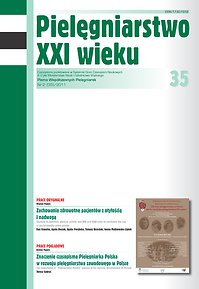Music in medicine as a component of the treatment of premature infants
Keywords:
music, medicine, premature infantAbstract
Introduction. Music is a complementary and supportive element of the process of integrated treatment in many disorders. Regardless of the age, musical stimuli regulate the body metabolism, affect the frequency and regularity of breathing, changes in pulse, blood pressure, as well as reduce the threshold for pain and muscle tension. In child-mother relationships, music allows for the nonverbal communication, and creates the sense of security.
Material and methods. The research was carried out in the study group covering 10 prematurely born infants between 30 and 35 weeks of gestation, with a stable circulatory and respiratory system. For the purpose of this research, the author’s observation form and choice of classical music (relaxing) were proposed. The study group of infants was divided into two groups; every day the first group listened to music using headphones; the second one did not. In both groups, the pulse rate and the oxygen saturation were observed. The observation was conducted for seven days and the time duration of the experiment depended on the length of child’s hospitalisation. The research material was verified and subjected to statistical analysis. The statistical hypotheses were formulated at the significance level p <0.05.
The results. In our study, the impact of music therapy on the general condition of prematurely born infants was observed. The relaxation music was played for every infant from the research group, and it had an impact on the decrease of the pulse rate (1 week: p=0,015; 2 weeks: p=0,007) and oxygen saturation (1 week: p=0,012; 2 weeks: p=0,020) within normal limits compared with the control group.
Conclusion. The relaxation music has a significant influence in the nursing care of the prematurely born infants and is similar to the philosophy of holistic nursing care.The music therapy treatment may improve the effective treatment of prematurely born infants and help them return to health. This therapy may bring benefits for the physiological function of the body by reducing heart rate and oxygen saturation level.
References
1. Bednarski J.M., Kulski M. Utwór muzyczny Patiens meus – komponent PAR (Programu Audioprofilowania Relaksacyjnego) RELAKSIS w niwelowaniu reakcji stresowej. Nowa stomatologia 2005; 1: 37-40.
2. Dobrzyńska E., Ceszrz H., Rymaszewska J., Kiejna A. Muzykoterapia. Psychiatria w Praktyce Ogólnolekarskiej 2006; 2 (6): 84-88.
3. Klein S.A., Winkelstein M.L. Enhancing Pediatric Health Care with Music. National Association of Pediatric Nurse Associates & Practitioners 1996; 10: 74-81.
4. Szulc W. Muzykoterapia jako przedmiot badań i edukacji. UMCS Lublin; 2005.
5. Konieczna E. J. Arteterapia w teorii i praktyce. Wyd. Impuls, Kraków; 2003.
6. Gasalberti D. Alternative Therapies for Children and Youth. With Special Health Care Needs. J Pediatr Health Care. 2006; 20: 133-136.
7. Lewandowska K. Muzykoterapia dziecięca. Studio Norma Gdańsk 1996.
8. Stouffer J.W., Shirk B.J., Polomano R.C. Practice Guidelines for Music Interventions with Hospitalized Pediatric Patients. Journal of Pediatric Nursing 2007; 22 (6): 448-456.
9. Śliwka A., Jarosz A., Nowobilski R. Muzykoterapia jako składowa kompleksowego leczenia. Polski Merkuriusz Lekarski XXI; 124: 401-405.
10. Talar A.D., Łukowicz M., Dejewska I., Jedwabiński M. Zagrożenia dla kształtowania się i funkcjonowania narządów zmysłów oraz rozwoju psychoruchowego u wcześniaków. [w] Edukacyjne zagrożenia i wyzwania młodego pokolenia. Edukacja XXI wieku. Poznań 2009.
11. Möckel M., Röcker L., Störk T., Vollert J., Danne O., Eichstädt H., Müller R., Hochrein H. Immediate physiological responses of healthy volunteers to different types of music: cardiovascular, hormonal and mental changes. Europen Journal of applied physiology and occupational physiology 1994; 68 (6): 451-459.
12. Ochwanowska A., Ochwanowski P., Gałuszka G., Gałuszka R., Borecki M. Research into influence of musicotherapy on rehabilitation of women after mastectomy. Annales Universitatis Mariae Curie-Skłodowska Lublin – Polonia 2005, Vol LX, Supll. XVI; 361: 115-119.
13. Malinowa M., Malinova M., Krŭsteva M. Therapeutic effects of music on preterm infants in neonatal intensive care units. Akusherstwo i Ginekologia (Sofiia) 2004, Supl. 43; 4; 29-31
14. Chou LL., Wang R.H., Chen S.J., Pai L.: Effects of music therapy on oxygen saturation in premature infants receiving endotracheal suctioning. Journal of Nursing Research 2003; 11 (3): 209-216.
15. Standley J.M. Music therapy for the neonate. Newborn & Infant Nursing Reviews 2001; 1 (4): 211-216.
Downloads
Published
Issue
Section
License
Copyright (c) 2011 Authors

This work is licensed under a Creative Commons Attribution 4.0 International License.




